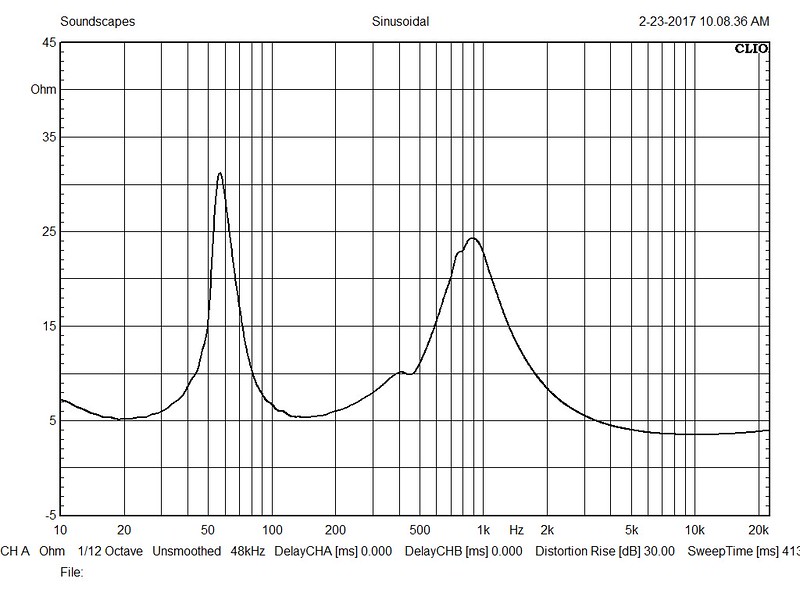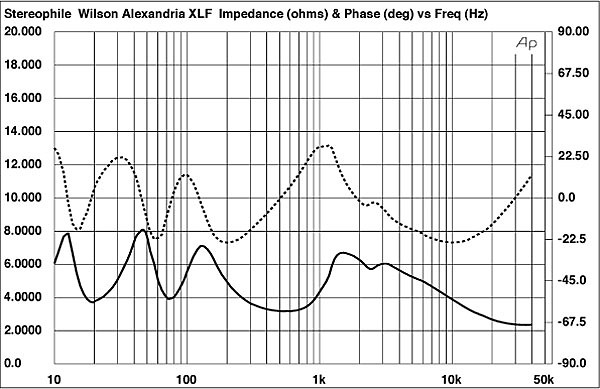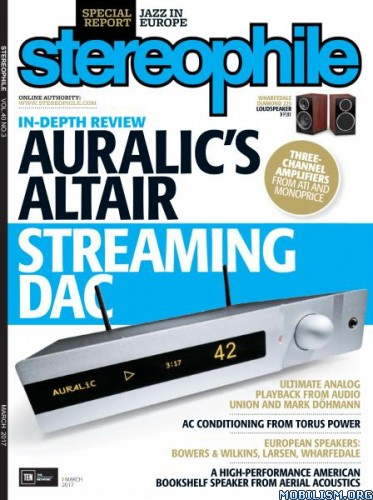To be fair, nobody would use a SET with that speaker Amir nor do most think SETs are universal.
Is Alexia different from other wilson on those figures
To be fair, nobody would use a SET with that speaker Amir nor do most think SETs are universal.
 xpe impedance by andromeda61, on Flickr
xpe impedance by andromeda61, on Flickr wilson xlf by andromeda61, on Flickr
wilson xlf by andromeda61, on FlickrMine are better in the impedance behavior
Here is XLF and mine
xpe impedance by andromeda61, on Flickr
wilson xlf by andromeda61, on Flickr
Mine are better in the impedance behavior
Here is XLF and mine , but 8 watt set no
xpe impedance by andromeda61, on Flickr
wilson xlf by andromeda61, on Flickr
Yours has zero phase plot?
I think Brad does recommend SET on Wilsons. I am all for SS going up to Dagostinos. Based on those graphs, which do you think works better? Of course, Brad is not for all SETs, mainly KR, which is different
NO to be honest i dont use /measure it , i could try to measure another time though .
IMO it is what it is, it arrises in the x over , so i correct/neutralise it there .
Just answer the question, have you made either a master's or PhD and/or mentored students in obtaining either or both? If no, upon what are you basing your judgement??So we find we disagree on what is a master thesis and a PhD thesis ... This forum is surely not interested in it, I will skip this part ...
IMHO we can get information from these works, but not use them as proof of our arguments. YMMV.
Long ago I tried a Cary 805 SET with Wilson/Puppy 5 and it sounded great. Some people are too worried about a few dB's up and down - just moving their head half a meter will cause much larger variance in frequency response.
I know of people using SETs on XLF's.
We were just being thought that the important aspect for sound quality is not the distortion figure, but the relative levels of the harmonics in the distortion spectra. Are we back in the old way?
I think Brad does recommend SET on Wilsons. I am all for SS going up to Dagostinos. Based on those graphs, which do you think works better? Of course, Brad is not for all SETs, mainly KR, which is different


Whoa. You didn't tell me it was 87 pages!I read or should I say suffered through it.
His work is quite extensive but alas, it misses core fundamentals for such work. If one wants to correlate subjective listening performance to objective data, both of them need to be on solid ground. The former unfortunately is not remotely so. He relies on a bunch of anecdotal evidence such as so and so reviewer saying an amp is good. And his own test which is but a footnote:
"15 Although a strict scientific experiment was conducted comparing the amplifiers I do not present an
detailed analysis here. In summary, the type 45 amplifier was chosen as preferable 100% of the time by all
the different listeners (5) in a “single-blind environment”, meaning, the listener toggled a remote push
button and either the amplifiers were swapped or not. A numeric display was incremented at each selection
and the listener noted if the amplifier changed or not, and if the change was to the one preferred. I attended
all sessions and verified that levels where matched, that there was no clipping, and the program material
kept within the flat pass-band of the type 45 amplifier-speaker combination. The source was a live piano
microphone feed."
Lots and lots of detail is missing here. For one thing, single blind tests are invalid unless they are shown to be practically equiv. to double blind. This would require for example for the test conductor to be out of view, no communication between him and testers, etc. None of this is stated so the door is wide open for invalid outcome (see https://en.wikipedia.org/wiki/Clever_Hans).
Second, there has to be statistical rigor in the listening tests. Enough trials need to occur to reduce probability of chance to .05. We don't know from his footnote if testers got the outcome right once, or a dozen times.
Then there is this detail which doesn't come out until the end of the paper in conclusions:
"For example, a set of 1960’s
Radio Shack 16 ohm PA monitors was necessarily chosen in the listening tests because it
had a very little impedance variation over the range of frequencies used in the listening
tests- a grand piano. As shown in Fig 3-5, this speaker was flat within +/- 0.25dB from
180Hz to 18kHz, meeting the ABX [40] specifications for frequency response matching.
Loudspeaker efficiency is also an issue with amplifiers with power outputs of less than
5W. "
He used a PA speaker? And one that matched the output impedance of the tube SET amp to produce a smooth response? What did it do for the solid state?
He also says a bunch of stuff that despite the length of the paper, are unsupported:
"1) The ears’ self generated harmonics mask external harmonic distortion that has the
same character. The ears’ harmonic distortion is fully studied and falls off at a rate of
approximately 10n
, where the power n designates the harmonic number. I propose
that external harmonics strictly adhering to this envelope are fully “undistorted” by
our ear-brain system and are thus indistinguishable from pure tones. An analytical
derivation of conformance to this aural harmonic envelope is developed."
Who says? Where are the careful listening tests that demonstrate this? No, you can't compare one amp to another to prove this. You have to create synthetic tests with such characteristics and demonstrate this.
I am also troubled by him saying the ear's distortion masks equipment distortion. Distortion is additive. It is not subtractive.
"To claim that these distortions are in-audible is fallacious, as they modulate at higher and
higher non-linear degrees with the instantaneous signal level."
This is an assertion, not a statement backed by research and fact. It is the type of thing one would read on forums, not in a scientific paper. Show the fallacious aspect, don't claim it.
"I emphasize that the subjective
capabilities of audio amplification are far more strongly aligned with open-loop linearity
than magnificent closed loop single-sine bench test results. "
Again, an opinion. His thesis around feedback is just plain wrong. Feedback reduces the levels of overall distortion to well below masking. Once there, it doesn't matter what pattern it has. The components are inaudible regardless of pattern. Or else masking would be invalid. Feedback's harm comes when you clip. Then it produces far more horrendous results than not having it. But below that threshold, it produces goodness that is easily verified with controlled listening tests and psychoacoustics.
Finally in the conclusion of his paper we got to the nut of it:
"The output impedance of these amplifiers is in the ohms range, hundreds of times worse
than solid-state push-pull amplifiers. This requires careful mating with loudspeakers that
do not have great impedance variation with frequency. "
This is why you hear different sound which you may prefer out of a tube amp. Its high output impedance has high interaction with the dynamic impedance of the speaker creating a unique (and colored) combination of amp+speaker. This behavior is highly audible and can be backed left and right. Changes as low as 0.5 db in low frequencies for example are audible. All the rest of his paper is, pardon my directness, nonsense compared to this fact.
What the heck does post #594 have to do with this thread?
Just answer the question, have you made either a master's or PhD and/or mentored students in obtaining either or both? If no, upon what are you basing your judgement??
Very few things in life are definitive but several studies are converging in a particular way about hearing, distortion and what it means.
What the heck does post #594 have to do with this thread?
bonzo75 said:I think he is trying to say that covers amps from Boulder and D'ags
| Steve Williams Site Founder | Site Owner | Administrator | Ron Resnick Site Co-Owner | Administrator | Julian (The Fixer) Website Build | Marketing Managersing |












